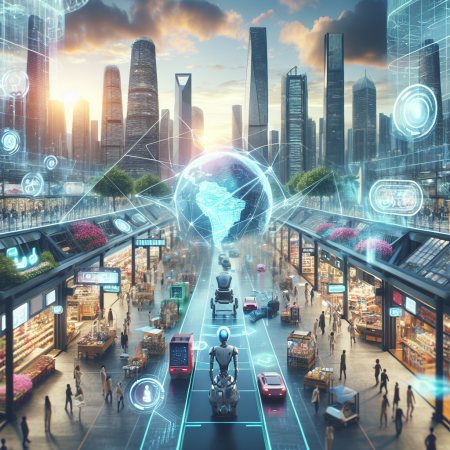Step into the era of smart commerce redefining buying and selling in 2025
The Rise of Artificial Intelligence in Commerce
Transforming Customer Experiences
Alright, let’s dive into how AI is shaking things up in the commerce space. In my experience, AI is not just a tech buzzword; it’s a game-changer. Think about how personalized recommendations have taken your shopping experience to the next level. When you scroll through your favorite online store, the items popping up are tailored just for you, right? That’s AI doing its magic.
But it goes beyond recommendations. AI-driven chatbots are now available 24/7, helping customers find what they want without the hassle of waiting for human assistance. Picture this: middle of the night, you realize you need a last-minute gift. A friendly chatbot can help you navigate choices as if you were chatting with a friend, making shopping seamless.
Moreover, AI is also improving inventory management. Imagine retailers knowing exactly what to stock based on predictive analytics. This means fewer out-of-stock situations and an overall smoother shopping experience for consumers. It’s the kind of tech that ensures we get what we want when we want it!
Understanding the Role of Data Analytics
Making Informed Decisions
If there’s something I’ve learned over the years, it’s that data is the new oil. Companies are now pouring over data analytics to understand consumer behavior better. This includes everything from purchase patterns to browsing habits. They’re deciphering what makes us tick and using that knowledge to enhance our experience.
For instance, when brands track engagement across different platforms, they can tweak their strategies in real-time. I’ve seen brands shift their entire marketing approach just by analyzing which ads resonate with their audience. It’s all about creating that connection with the consumer, and the data provides the roadmap.
Let’s not forget about predictive analytics! This helps businesses to anticipate future trends based on past data. Isn’t it impressive to think that companies can forecast our needs before we even realize them? It transforms the traditional strategy of just keeping up with trends to being ahead of the curve.
The Shift to Personalized Marketing
Reaching Customers on a Personal Level
Personalization isn’t just a fancy word; it’s become the backbone of effective marketing approaches today. When I get a recommendation that feels like it was made just for me—trust me, I’m way more likely to make a purchase. Brands should leverage the knowledge they have about consumers to craft messages that resonate on a deeper level.
Years back, marketing was about blasting the same ads to everyone. Nowadays, it’s about segmentation and tailoring content to specific audiences. I remember working with an e-commerce client who personalized their email campaigns. The open rates skyrocketed because people felt the emails were tailored to their interests. Who doesn’t love feeling special, right?
Additionally, the use of dynamic content that changes based on user behavior is becoming common. This way, every interaction feels unique. When I visit a site and see content that truly reflects my preferences, it creates a connection that builds loyalty. Brands that get this right are definitely ahead in the game.
Embracing Sustainability in Commerce
Connecting with Conscious Consumers
Let’s be real—consumers today care a lot about sustainability. I’ve seen companies successfully integrate green practices into their operations, and honestly, it’s inspiring. It’s no longer just about making a sale, but also about how that sale impacts the environment.
Consumers appreciate when brands are transparent about their sustainable practices. When I see a brand using eco-friendly materials or committing to reducing their carbon footprint, it influences my purchasing decision. Many businesses are now highlighting these efforts in their marketing to attract conscious consumers.
Moreover, sustainability doesn’t just attract attention; it fosters loyalty. When I find brands that align with my values, I tend to stick with them long-term. The shift towards sustainable commerce isn’t just a trend; it’s becoming a fundamental aspect of how we buy and sell in 2025.
Integrating Omnichannel Experiences
Creating a Seamless Customer Journey
I believe that seamlessness is becoming the gold standard for shopping in the digital age. Omnichannel experiences connect various platforms, allowing customers to interact with brands effortlessly across different touchpoints. Imagine starting a shopping spree on your phone while commuting and finishing it in-store. That’s what it’s all about!
When I shop, I want to switch between my phone, laptop, and the physical store without feeling disconnected. Retailers that implement robust omnichannel strategies are winning my business. It’s not just about the sale anymore; it’s about the journey leading up to that moment.
Furthermore, the integration of online and offline experiences offers consumers the freedom to shop in the way they prefer. Whether it’s click-and-collect options or seamless returns, the blend creates a holistic customer experience. It’s refreshing to know that brands are finding ways to keep us happy no matter how we choose to shop!
Frequently Asked Questions
What is smart commerce?
Smart commerce refers to the innovative use of technology, data analytics, and personalized strategies to enhance shopping experiences for consumers while optimizing the selling processes for businesses.
How does AI impact customer experience?
AI transforms customer experiences by providing personalized recommendations, facilitating 24/7 support through chatbots, and optimizing inventory management, ensuring customers find what they need, when they need it.
Why is data analytics important for businesses?
Data analytics provides valuable insights into consumer behavior, enabling businesses to make informed decisions, craft relevant marketing strategies, and anticipate future trends effectively.
What role does sustainability play in modern commerce?
Sustainability is becoming increasingly essential as consumers prefer brands that demonstrate eco-friendly practices. It influences purchasing decisions and fosters long-term customer loyalty.
What is an omnichannel experience?
An omnichannel experience provides a seamless shopping journey across different platforms, allowing consumers to move effortlessly between online and offline shopping methods, enhancing overall customer satisfaction.


